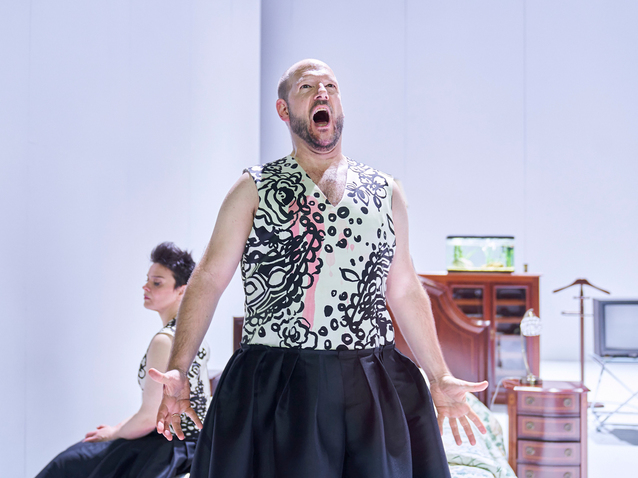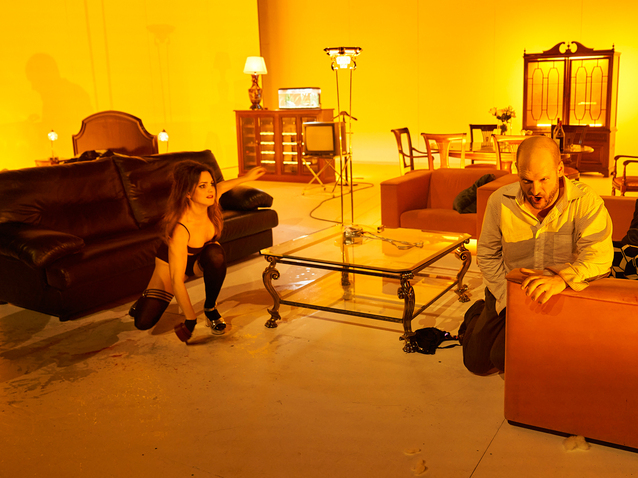 © Liceu / Ruano
© Liceu / Ruano
The opera Orgia, for three voices and chamber orchestra, with music by Hèctor Parra and libretto by Calixto Bieito, which had its world premiere at the Teatro Arriaga in Bilbao in June 2023, has now arrived at the Liceu in Barcelona.
Orgia, of which only two performances will be offered in Barcelona, is based on the play of the same name by Pier Paolo Pasolini, which was premiered -some say not very successfully- in Turin in 1968. Bieito's libretto has reduced the theatrical text by two thirds, but it is constructed with phrases that strictly respect the author's text and also respects the original theatrical distribution with a prologue and six scenes that are interpreted without pause.
The play presents us with a middle-class married couple who apparently live a conventional life but intimately maintain a destructive sadomasochistic relationship full of violence and mutual loneliness. In the end, the woman, emulating Medea, will murder their children. The man, dressed as a woman, after murdering a prostitute, will commit suicide to denounce the impossibility of being able to publicly and socially assume his homosexuality. The opera begins, like the play, with the man already hanged, telling us in the following six scenes how he has reached that point.

Orgia, Gran Teatre del Liceu (2024)
The Orgia Pasoliniana, where the term "petit-bourgeois", nowadays totally in disuse, abounds, is a typical product of that time that globally could be placed in the third quarter of the twentieth century in which left-wing intellectuals, imbued with a laudable pedagogical zeal, believed, perhaps naively, that by confronting the bourgeoisie with the contradictions in which they lived and the lies of their lives, they would change something. They ignored the fact that a good part of the bourgeoisie -being bourgeois does not mean being stupid- already knew that their life was a contradiction built on lies and, as a miserable but possible form of survival, it seemed good enough to them.
Pasolini's theatrical work would probably have found a more suitable artistic vehicle for his intentions in the form of a literary work; turned into an opera it does not work as a whole because of the excess of discourse and the lack of theatrical interaction between characters. However, there are moments when you feel that Pasolini, beyond his didactic zeal, is getting very close to fundamental, dark and profound knowledge. For example, he refers us to the unbearable atavistic and primitive force of eroticism, to the seductive impulse of self-destruction or to the intimate prisons we build within ourselves.
When this closeness to the "hot spots" of the mystery of living is touched by music and by the power of song which is in itself another mystery, that knowledge, whilst not revealing itself completely, takes on a new light and gets very close, perhaps only a step away, from an absolute understanding which, if it were to fully arrive, would destroy us.
Parra, who already has a considerable number of operas composed and premiered, has been developing his vocal writing, which now, without being properly "cantabile" in the conventional sense, is much more suitable for singing, more accessible and, for example, does not conflict with the elaborate instrumental writing that occasionally moves away from atonality to take some lyrical melodicism.

Orgia, Gran Teatre del Liceu (2024)
The work of Bieito, who in addition to the libretto signs the stage direction, scenography and costumes, is important and full of strength and manages to make that bland bourgeois home that we initially see on stage gradually become a real "chamber of horrors" and transmits with intensity the external suffering, but also the internal one, of the characters.
The artistic team that presented the work at the Liceu was, with some important changes, the same as the one that premiered the work in Bilbao. The main soprano, Aušrinė Stundytė, the secondary soprano in the role of the prostitute, Jone Martínez, and the musical director, Pierre Bleuse, repeated. The baritone, Christian Miedl, was new and making his debut in the role.
The artistic level reached by all was high, but it is worth mentioning the great musical and also scenic work of Aušrinė Stundytė. The Liceu Orchestra assumed the work of the "chamber ensemble" announced in the title although given the dimensions of the Liceu hall had to be enlarged in relation to the one used for the premiere in Bilbao. They offered, faced with a score that was not easy at all, an optimal performance.
Xavier Pujol
Barcelona, April 11th, 2024
Orgia by Hèctor Parra. Aušrinė Stundytė, soprano. Christian Miedl, baritone. Jone Martínez, soprano. Orchestra of Gran Teatre del Liceu. Pierre Bleuse, Conductor. Calixto Bieito, Stage Director, Libretto, Scenography and Costumes. Michael Bauer, Lighting. Coproduction by Teatro Arriaga (Bilbao), Gran Teatre del Liceu and Festival Castell de Peralada.
the 13 of April, 2024 | Print
Comments